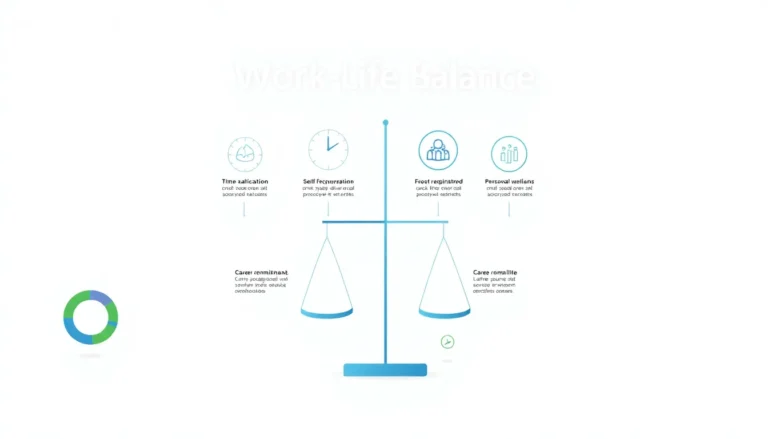Table of Contents
ToggleFinding a job that feels like a harmonious blend of your career ambitions and personal life can be as elusive as a unicorn in a forest of the mundane. With a world filled with endless options, how do you sift through the noise and find that golden opportunity? More importantly, how do you strike the oh-so-coveted work-life balance? Well, fret not. This guide is here to help you uncover the jobs that offer more than just a paycheck: they promise a life worth living. Grab your favorite beverage, and let’s jump into the vibrant world of careers that value your time and well-being.
Understanding Work-Life Balance

Work-life balance: it’s that magical term tossed around in job listings like confetti at a parade. But what does it really mean? Essentially, work-life balance refers to the equilibrium between the demands of one’s job and personal life. A healthy work-life balance means having enough time for family, hobbies, and relaxation, without sacrificing job performance or career progression.
To understand this concept fully, one must realize that achieving work-life balance isn’t a one-size-fits-all equation. What feels balanced for one person might seem chaotic for another. It involves prioritizing aspects of life according to individual needs and values. This intricate dance involves time management and self-awareness, where finding the right rhythm allows for both productivity and personal fulfillment.
Factors That Contribute to Work-Life Balance
Several key factors contribute to achieving a good work-life balance, and understanding them can be the key to your success.
- Flexible Work Hours: Flexibility can transform the ordinary into extraordinary. Jobs that offer flexible hours enable employees to set their own schedules, allowing them to juggle personal responsibilities without sacrificing career goals.
- Remote Work Opportunities: The rise of digital communication has paved the way for remote work, letting employees operate from the comfort of their homes, or wherever they can find good Wi-Fi. This arrangement eliminates time-consuming commutes and fosters a better work-life integration.
- Supportive Company Culture: A company that values its employees’ personal lives creates an environment of trust. Organizations that actively promote a healthy work-life balance often see happier employees, which leads to increased productivity.
- Adequate Time Off: Paid time off, including sick days and vacations, is crucial. Companies that understand the importance of rest and rejuvenation usually have employees who are more engaged and committed.
- Clear Boundaries: Establishing boundaries between work and personal life is essential. Employees should feel empowered to disconnect from work communications during personal time.
Top Jobs Offering Work-Life Balance
Some jobs are renowned for their work-life balance qualities, so if you are looking for your dream position, these suggestions might just fit the bill:
- Software Developer: Many tech companies offer flexible schedules and the option to work remotely. Developers often find that they can complete tasks more efficiently without a traditional office environment.
- Marketing Specialist: With the rise of digital marketing, many marketing roles provide flexibility in terms of hours and remote working possibilities. Specialists often work on projects that allow for creativity, enhancing job satisfaction.
- Human Resources Manager: HR roles typically promote a supportive work culture and adhere to work-life balance principles. Managers in this space often enjoy structured hours and the fulfillment of aiding employee satisfaction.
- Data Analyst: Data analysts often have the flexibility to create their own schedules while diving into meaningful work that helps organizations make informed decisions.
- Creative Writer: Freelance opportunities abound for writers, allowing them to choose projects and set their own hours. This can result in a rewarding and well-balanced life, though it requires discipline to maintain consistency.
Benefits of Prioritizing Work-Life Balance
Fostering a work-life balance leads to a plethora of benefits, not just for employees but for companies as well. Here are a few key advantages:
- Enhanced Productivity: Employees with a healthy work-life balance tend to be more productive. They are less likely to experience burnout, creating an environment where both creativity and efficiency can thrive.
- Increased Job Satisfaction: Individuals who feel their personal lives are supported report higher job satisfaction. This leads to greater loyalty and retention within the organization, eventually benefiting the company’s bottom line.
- Better Health: Prioritizing personal life can promote better mental and physical health. Healthier employees are more engaged and less likely to take sick days.
- Lower Stress Levels: A balanced lifestyle leads to reduced stress, encouraging a positive work environment that fosters collaboration and team spirit.
- Attractive Workplace Culture: Companies that emphasize work-life balance attract top talent. Prospective employees look for cultures that value their well-being, making these companies stand out in a crowded job market.
Challenges to Achieving Work-Life Balance
While seeking a good work-life balance sounds appealing, there are distinct challenges that can make the journey bumpy.
- High Workplace Expectations: Many organizations maintain high performance standards, making it difficult for employees to take breaks without feeling guilty.
- Tight Deadlines: In fast-paced environments, deadlines can be stressful, often forcing individuals to prioritize work over personal life temporarily.
- External Factors: Personal responsibilities, such as family obligations and financial pressures, can complicate efforts to maintain a balanced life.
- Technology Overload: The rise of remote work and constant connectivity through smartphones often leads to blurred lines between work and home life, making it hard to disconnect.
- Cultural Norms: In some industries, long hours and dedication are praised, creating peer pressure to conform to those expectations, regardless of personal needs.
Tips for Finding a Job With Work-Life Balance
Looking to land a job that prioritizes work-life balance? Here are some effective strategies:
- Research Companies: Look for organizations renowned for their positive work culture. Sites like Glassdoor provide employee reviews that can offer insights into how companies treat their personnel.
- Ask the Right Questions: During interviews, don’t shy away from asking about work-life balance initiatives. Questions like “What does a typical workweek look like?” can help gauge the company’s commitment to this aspect.
- Network: Connect with current or past employees through platforms like LinkedIn. They can provide firsthand insights about their experiences and the reality of work-life balance within the organization.
- Consider Freelance Options: If flexibility is a top priority, consider freelance or contract work. This can often provide the freedom to work on your terms.
- Reflect on Your Needs: Determine what work-life balance looks like for you. It can help to clarify your priorities before diving into job applications.







